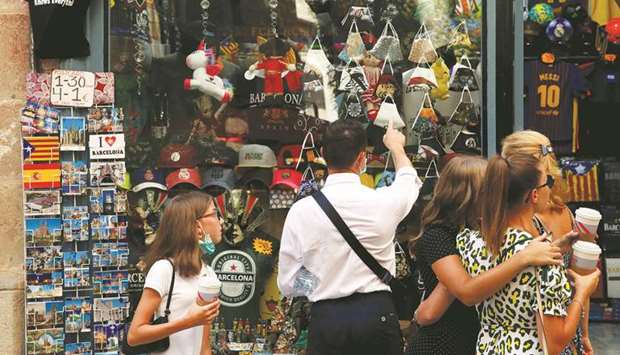As one of the world’s top tourist destinations, Spain was hoping to salvage the summer by billing itself as a safe haven from the pandemic. But with infections surging, all bets are off.
Britain’s decision late on Saturday to impose quarantine on all travellers coming from Spain represents a huge setback: British tourists are the largest national group of visitors, with 18mn of them taking a Spanish holiday in 2019.
“It’s a very tough blow” given that the tourist sector “had hoped to be able to turn things around in August,” Ximo Puig, the Valencian regional president told Cadena Ser radio. For some resorts in the Valencia region, like Benidorm, British tourists constitute 40% of visitors. The announcement was terrible news to the embattled sector, which had hoped the summer months would help it claw back some of the colossal losses incurred through months of lockdown to slow the spread of the virus.
“We’d had a good feeling about the coming weeks with reservations picking up and although we were far from the norm for this time of year, we were hoping things would get back to normal by September or October,” the HOSBEC regional hotels association said in a statement.
“There have already been cancellations and more are expected. Nobody is going to come here for a week’s holiday and then spend 14 days shut away when they get back home,” said Emilio Gallego, secretary general of Spain’s hotels association. The Exceltur tourism association estimates Britain’s quarantine move could cost up to 8.7bn euros in August and September, a major hit to a sector whose turnover had already been expected to halve this year.
Conscious of the impact on a sector that accounts for 12% of GDP and 13% of employment, Madrid has sought to ease the restrictions for those returning from the Canary Islands or the Balearic Isles.
Although TUI, Britain’s biggest tour operator has cancelled all holidays to mainland Spain, it said the decision did not apply to the Canaries or Balearics where Covid-19 case numbers are markedly lower.
The southern region of Andalusia and the Valencia region, have both asked to be included in Britain’s so-called “travel corridors” that would exempt visitors from quarantine requirements. Spain had worked hard to reassure tourists it was a safe destination despite the pandemic.
Since April, at the height of lockdown, resorts began planning a battery of safety measures including social distancing on the sand, safe spacing within bars and restaurants, and temperature checks at the entrance to some hotels. But industry insiders have watched with concern as new infections have risen, with the figure tripling in two weeks, government figures show. Over the past 14 days, Spain has seen 40 new cases per 100,000 inhabitants, compared with 15 in Britain and France and eight in Germany, according to an AFP calculation based on official figures.
In terms of deaths, however, Spain has recorded just 26 in the past fortnight, far behind Britain, which has counted 816. And the situation varies hugely between regions. Aragon and Catalonia in the northeast counted the highest number of new cases, which notably occurred in agricultural areas, while in Andalusia in the south and Valencia in the east, new cases are far fewer.
Although France on Friday advised its citizens against travelling to Catalonia, regional president Quim Torra insisted that “major tourist destinations such as the Costa Brava and the Costa Dorada remain unaffected and people can travel there safely”. At the same time, the situation remains “critical” in metropolitan Barcelona and Lerida where residents have been ordered to stay at home.
Denouncing the situation as “unjust.. and totally illogical”, the Spanish Confederation of Hotels and Tourist Accommodation (CEHAT) insisted its establishments had “the strictest protocols in Europe”. It also called for “surgical” measures to halt the localised outbreaks and asked that tourists be tested before travelling and again before going home to avoid the need for quarantine.

People look at masks displayed at a souvenir shop, amid the coronavirus disease outbreak, in Barcelona, Spain.
